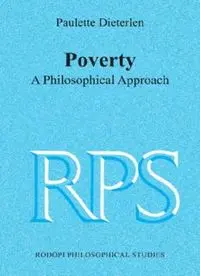
Poverty: A Philosophical Approach PDF
Preview Poverty: A Philosophical Approach
3RYHUW\ 5RGRSL3KLORVRSKLFDO6WXGLHV (GLWHGE\ )UDQFLVFR0LUy4XHVDGD 8QLYHUVLW\RI/LPD (UQHVW6RVD %URZQ8QLYHUVLW\ $PVWHUGDP1HZ<RUN1< 3RYHUW\ $3KLORVRSKLFDO$SSURDFK 3DXOHWWH'LHWHUOHQ 7KHSDSHURQZKLFKWKLVERRNLVSULQWHGPHHWVWKHUHTXLUHPHQWVRI³,62 ,QIRUPDWLRQDQGGRFXPHQWDWLRQ3DSHUIRUGRFXPHQWV 5HTXLUHPHQWVIRUSHUPDQHQFH´ ,6%1 (GLWLRQV5RGRSL%9$PVWHUGDP1HZ<RUN1< 3ULQWHGLQWKH1HWKHUODQGV For Emilio, Alejandro and Maurizio This page intentionally left blank CONTENTS Foreword 1 Introduction 5 I. Two Concepts of Poverty 11 II. Criteria of Distribution 45 III. The Rights of the Poor and Our Obligations Toward Them 79 IV. Utility and Norms in the Study of Poverty 109 V. Equality 135 Conclusions 163 References 167 This page intentionally left blank FOREWORD The idea of writing a book about poverty arose after having studied over a long period the main aspects of the theory of justice. Obvi- ously, Rawls’s A Theory of Justice was a major influence. My inter- est in concentrating on a particular aspect of justice arose from the reading of Michael Walzer and Jon Elster. It was Amartya Sen who led me directly to the subject of poverty. I have discussed my work in many academic forums and been greatly stimulated by the exchange of ideas with colleagues. Among these I would like to mention Elisabetta Di Castro, to whom I am particularly grateful; I must point out that in recent years all my texts have passed before her acute and intelligent gaze. Discussions in the Program for Advanced Studies in Sustainable Development and En- vironment at El Colegio de México were for me extremely enriching, and what I learned from Boris Graizbord, Rosa María Ruvalcaba, Fernando Cortés and Enrique Hernández Laos was decisive. My gratitude is due to Alicia Ziccardi for the invitation to take part in the Forum on Poverty organized by the CLACSO working group. Julio Boltvinik showed interest in my work and provided me with material related to the so-called and much discussed “poverty lines”. I had the opportunity to spend a sabbatical year in the Mexican Government’s Education, Health and Food Program (PROGRESA), thanks to the generosity and interest shown in the subject of my re- search by the Program’s coordinator at the time, José Gómez de León. To a large extent this book is due to him. In Mexico, any per- son who takes seriously the study and application of policies to com- bat poverty must inevitably have in mind a memory of “Pepe”. Many people helped me at PROGRESA, among them Magdalena Torres, Susan Parker, Patricia Muñoz and Daniel Hernández. Several of the ideas expressed here can be found in articles and 1 chapters of books published beforehand; I should like to express my 1 “PROGRESA y la atención a las necesidades básicas”, in Alivio a la pobreza, análisis de del Programa de Educación, Salud y Alimentación, CIESAS and PROGRESA, Mexi- co City, 1998, pp. 130–143; with José Gómez de León, “Diversidad humana, liber- tad y capacidades en la obra de Amartya Sen”, Metapolítica, no. 10, vol. 3, April- June, 1999, pp. 339–351; “Dos conceptos de pobreza”, in Juliana González (ed.), Moral y poder, Secretaría de Educación Pública/Academia Mexicana de Ciencias y Tecnología/Consejo Consultivo de Ciencias de la Presidencia de la República, FOREWORD 1
